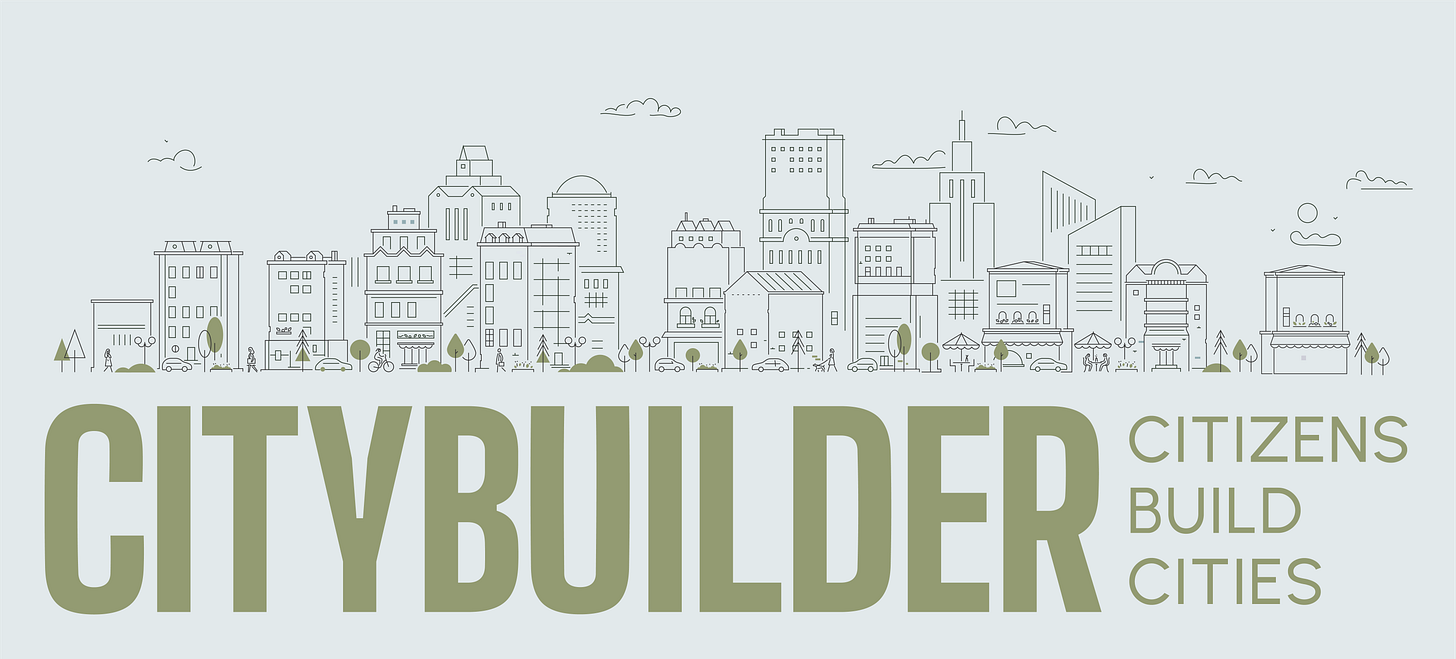Gen Y: Why CITYBUILDER?
a Millennial designer, mom & housing advocate explains why housing matters

People often ask me how I became a housing advocate. A few years back, when I was a recent architecture school grad and new homeowner, I was excited about the idea of building a backyard cottage (ADU)—only to find out that it wasn’t allowed.
At the time, Raleigh was in the midst of a long debate on whether to legalize ADUs. The City had banned ADUs decades ago (like many cities in the U.S.) under the guise of preventing blight, overcrowding, and transient renters. Some leaders in the community were fighting to keep those bans in place even in 2017.
My professor, Tom Barrie, encouraged me to speak at a pivotal City Council meeting. I argued for allowing ADUs by right because any homeowner should have the right to choose who lives in their backyard. The choice shouldn’t involve politics or a popularity contest.
That night, I found myself stepping into a movement that I didn’t even know existed.
THE HOUSING MOVEMENT
Since then, I’ve met so many incredible people in the local housing movement—renters, builders, designers, policymakers, and advocates. Organizations like Wake Up Wake County, Raleigh Forward, and Durham Builders Guild have been leading the way on land use reform, missing middle housing, and sustainable development. Each of these groups is tackling a piece of the housing crisis, but their efforts can feel disconnected. We must bridge these gaps and work together toward practical solutions.
I was born into a recession, graduated into another, and have navigated a housing market that feels impossible.
ENTER GEN Y
That need for collaboration is particularly urgent for my generation. As a millennial mom of four, my life has been shaped by economic instability. I was born into a recession, graduated into another, and have navigated a housing market that feels impossible. These challenges have made millennials the first generation expected to be poorer than their parents. With impacts beyond affording the stereotypical avocado toast, many of us struggle with student debt, wage stagnation, and skyrocketing housing costs.
In the Triangle, we see this tension play out clearly, with housing at the center. Our rapid growth drives both economic success and growing inequality. Housing policies dictate everything else: transportation policy; school districts and bussing; parks; access to green spaces; and of course, economic opportunity. All are shaped by how we allow housing to be built.
A recent study led by a University of Utah geographer suggests that urban sprawl impedes intergenerational mobility for low-income residents and reinforces racial inequality. The research indicates that sprawling urban development patterns limit access to the opportunities and resources which are necessary for upward mobility.
For the past half-century in North Carolina, housing policies have favored single-family suburban development, leading to several interconnected challenges. This approach has reinforced car dependency, escalated land costs, and limited housing choices. Zoning restrictions have hindered the construction of smaller, more affordable homes, pushing working families farther from employment centers, schools, and essential services. The emphasis on low-density sprawl has strained public infrastructure, underfunded public transit, and contributed to environmental degradation. Moreover, these policies have deepened economic segregation, often rooted in exclusionary zoning practices that, despite the prohibition of explicit racial barriers, continue to influence patterns of displacement and wealth inequality today. This development model has also been linked to social isolation, as sprawling suburban layouts can reduce opportunities for community interaction, exacerbating feelings of loneliness. As research on land use and housing forms has repeatedly shown, this model no longer serves our communities, and the growing affordability crisis underscores the urgent need for change.
CHANGE IS HAPPENING
Thankfully, that change is happening. Raleigh and Durham have legalized duplexes, eliminated parking minimums, streamlined ADU approvals, and introduced innovative zoning reforms. Durham now leads the nation with first-of-its-kind YIGBY (Yes In God's Backyard) accessory dwelling provisions for faith institutions. Raleigh’s leaders have shown their dedication to reform by legalizing more density through text changes and rezonings. And seen the benefits already begin: local rents have started to go down, while the rest of the country saw increases. Chapel Hill made missing middle zoning reforms a priority last year. These are victories worth celebrating – but there is still more work to do.
That’s why I started CITYBUILDER – to create a place where housing advocates, builders, and organizers can connect and amplify each other’s work.
CITYBUILDER is here to connect the people already fighting for more housing, to celebrate pro-housing progress so others can learn from it, and to make advocacy easier to access. CITYBUILDER welcomes more neighbors and encourages young people like me to get involved and make a difference.
Jenn Truman is a designer with experience in architecture, civil engineering, and interior design. She has worked in the Triangle for small, local architecture and civil engineering firms for over a decade, bringing to life some of Raleigh and Durham’s favorite retail and restaurant projects.
Jenn has a passion for designing experiences and places and believes in building things together. As a young designer, leader, and advocate based in Raleigh, she is embedded in the local community through her professional and volunteer work. Jenn is an avid transit user and advocate and currently serves as Chair of the Raleigh Transit Authority.



